v1.0.48 Laubwerk Plants Kit 13 – Temperate Deciduous Trees
EDIT in Admin Edit in WP
Downloads
Download demos and trial versions, product documentation, free presets and more.
You may download a free Demo after logging in.

Temperate Deciduous Trees
Plants Kit 13 is a selection of both charming and common temperate deciduous trees mainly from Northeastern America, temperate Europe and East Asia planted in parks, gardens, or streets including showy specimen trees such as the Japanese angelica tree, the showy crab apple, ‘Merrill’ magnolia, and white willow, as well as some very common street trees such as the columnar Norway maple and Turkish hazel.”
10 broadleaf tree species of Laubwerk Plants in 3 variants, 3 ages and 4 seasons each, for architects and CG artists working in 3ds Max, Maya, Cinema 4D, and SketchUp.
3D Plants for CG Artists
Laubwerk offers easy-to-use software extensions for architects and CG artists looking for authentic 3D plants, and plant scattering tools.
With drag-and-drop simplicity, and easy-to-use tools that modify the shape, age, season and level of detail for each of Laubwerk’s stunning 3D plants, users can seamlessly add 3D trees to any CG project. For Autodesk 3ds Max & Maya, MAXON Cinema 4D, Trimble SketchUp, and Python.
Includes 360 Models
All Laubwerk Plants in this Kit come in 36 variations per species, i.e. 3 variants, 3 ages and 4 seasons. Here are a few examples of the variety:
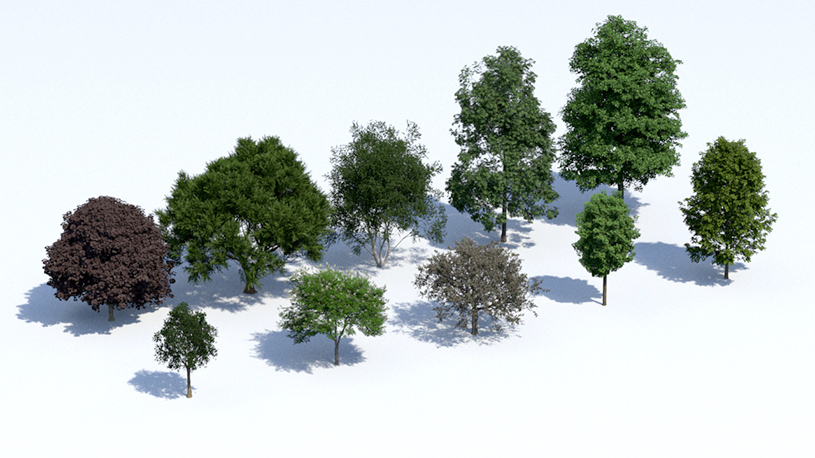
Summer: 10 out of 360 temperate deciduous tree models of Laubwerk Plants Kit 13.
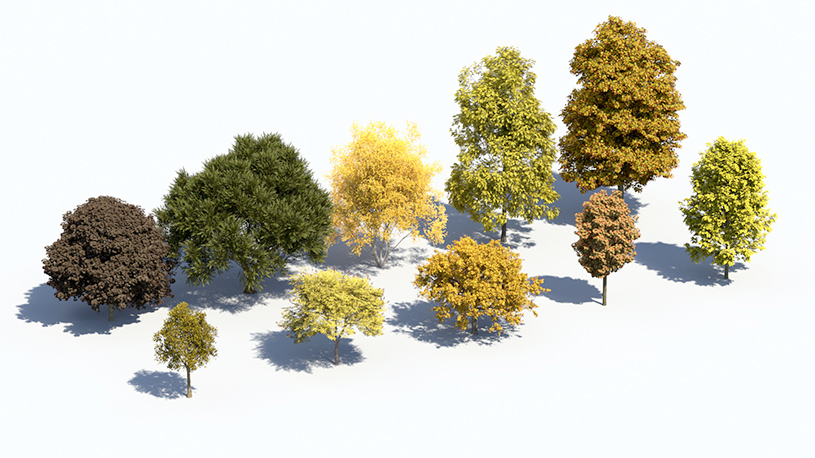
Autumn: 10 out of 360 temperate deciduous tree models of Laubwerk Plants Kit 13.
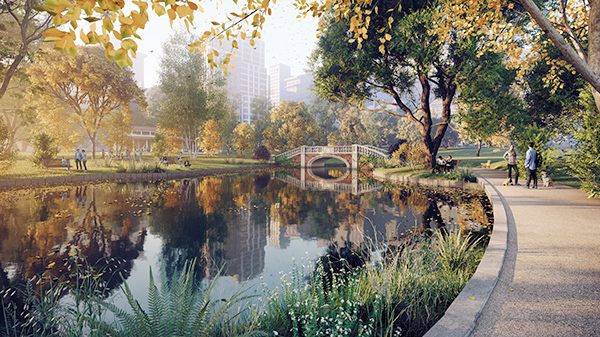
Kizo’s Central Park using Plants Kit 13—temperate deciduous trees
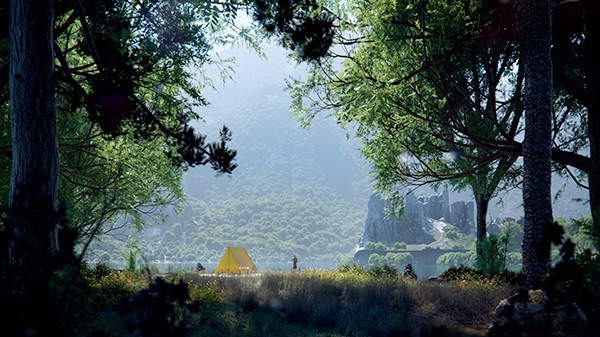
The Lake (artwork by Thomas Vournazos, Slashcube, using Cinema 4D, Corona Renderer, and Plants Kit 13)
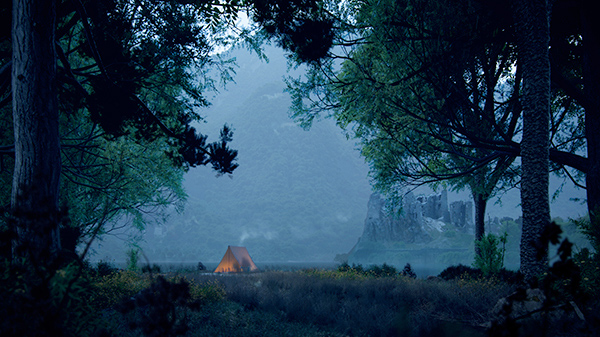
The Lake—Evening in Summer with Campfire
Includes Free Laubwerk Player
The free Laubwerk Player plugin comes bundled with each of the Laubwerk Plants Kits.
Use the Laubwerk Player to easily load and control plant models inside Autodesk 3ds Max & Maya, MAXON Cinema 4D and Trimble SketchUp. Just drag-and-drop your 3D tree, set the shape, age, and season and level of detail control. Watch the lightning fast rendering with inbuilt and 3rd parts renderer support.
Laubwerk Player Plugin
Inserting, controlling and rendering great-looking 3D tree models has never been easier with the Laubwerk Player plugin! The Laubwerk Player provides immediate visual access to your Laubwerk plant library. You get multiple drawing options in the viewport (like simple hull shape or skeleton) for quick feedback and low memory usage while editing your scene. And when you’re satisfied, watch the Laubwerk Player dynamically render fully-detailed plant models at amazing speeds, with automatic default materials and level of detail.
Plant Library Browser
The Plant Library Browser appears right in the 3ds Max, Maya, Cinema 4D or SketchUp main menu and provides direct access to the Laubwerk Plants installed on your computer. Drag-and-drop your 3D tree species into your scene or replace existing trees. Loading the plants through the Plant Library Browser directly creates materials with basic shading and textures preassigned, saving you time and memory while you work.
Plant Object
The Plant Object represents a Laubwerk plant model in your scene by using low-memory hull or skeleton mode for easy placement. It dynamically loads the model’s age and shape that you chose, creating a simple viewport approximation that allows you to apply model alterations and adjust level of detail settings. Laubwerk Plant Objects are fully scriptable using MaxScript.
V-Ray Support
Dedicated support of V-Ray saves you time and memory. Instead of manually converting Laubwerk Plant Objects into V-Ray proxies, the Plant Object detects when V-Ray is used for rendering and dynamically creates the model’s geometry during rendering. This is the exact same process V-Ray uses for V-Ray proxies, just automatically applied without any manual setup.
Renderer Support
Materials and textures are created on the fly – for the built-in renderer or third-party renderers.
- For 3ds Max, Maya, and Cinema 4D: mental ray, iray, Maxwell Render, Thea Render, Arnold, OctaneRender, Corona Renderer and Redshift.
- For SketchUp: V-Ray for SketchUp and Thea Render for SketchUp.
Laubwerk Advantage
- Plug and Play – One-click solution for architects and CG artists who need realistic 3D trees, immediately.
- Fast and Fluent – Render-ready 3D trees minimize the need for finetuning that can otherwise interrupt your workflow.
- Easy and Integrated – Drag-and-drop plants inside 3ds Max & Maya, and MAXON Cinema 4D, or Trimble SketchUp.
- Intuitive – Simple settings are a mouse click away.
- Smart Content – Go beyond static models! Choose the shape, age, season and detail of each tree.
- High Tech – Laubwerk technology minimizes the usual compromise between high-quality graphics and efficient memory usage.
Realistic 3D Tree Models
Laubwerk uses a hybrid of procedural modeling and hand-detailing by botanist and 3D artists to make the most realistic CG trees.
- Render-ready materials and textures are created on the fly – for the built-in renderer (3ds Max, Maya & Cinema 4D), or third-party renderers such as V-Ray, mental ray, iray, Maxwell Render, Thea Render, Arnold, OctaneRender, and Corona Renderer.
- Leaves consist of more than just a single polygon, so they bend and catch highlights.
- Textures are based on high quality photos from real trees.
- Models maintain shape and density, regardless of detail level.
Description
The following 10 tree species are included in the Plants Kit 13. Each species comes in 36 variations per species, i.e. 3 variants, 3 ages and 4 seasonal aspects, for a total of 360 models per Kit.
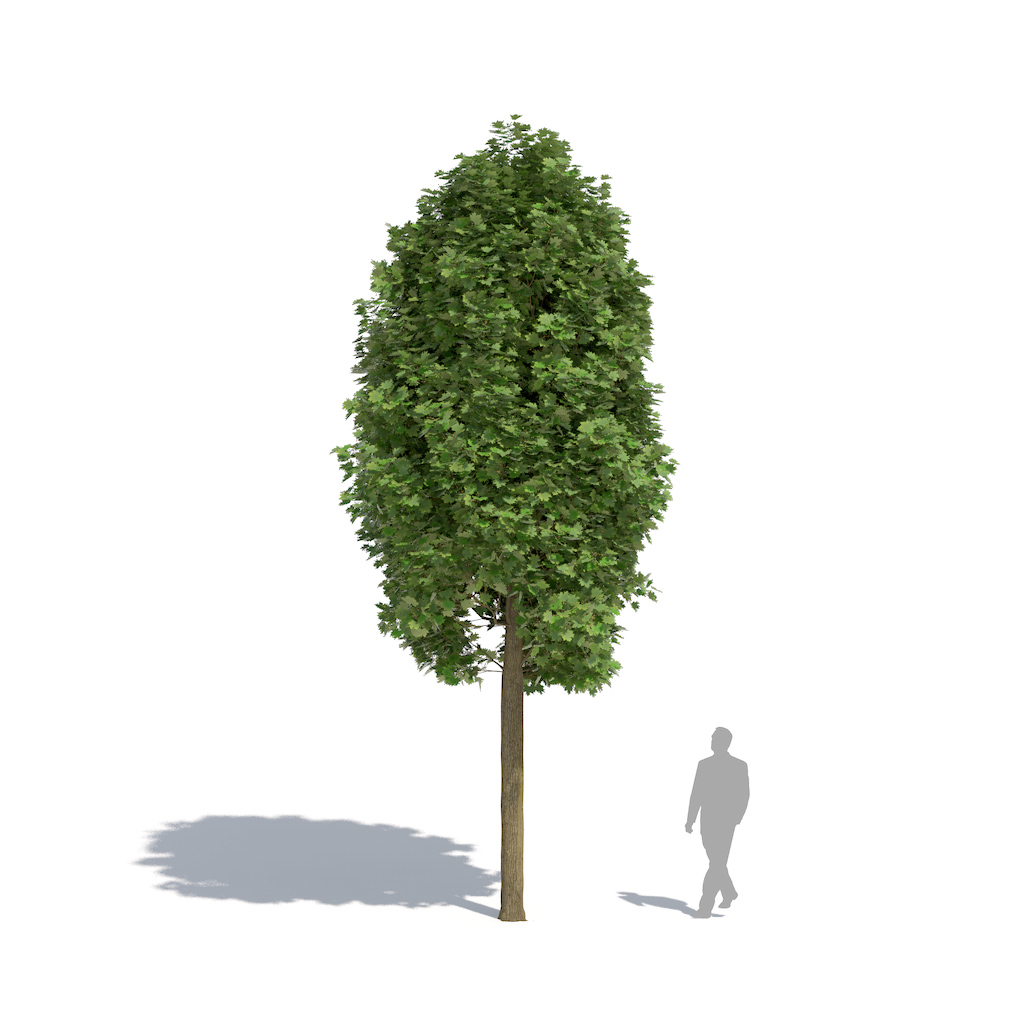 Columnar Norway maple
Columnar Norway maple
Acer platanoides ‘Columnare’
Medium-sized deciduous tree with a dense crown. Egg-shaped at first, becoming columnar as it matures. Clear stem, with dark-grey bark and light-brown branches. Five to seven lobes, large green leaves, turning golden yellow in autumn. Yellow-green flowers appear before the leaf unfurls. Profuse inflorescence. Fruits are winged nutlets (samara). This old French cultivar is selected for its narrow upright growth, making it suitable for narrow streets and avenues. The flowers are frequently visited by bees.
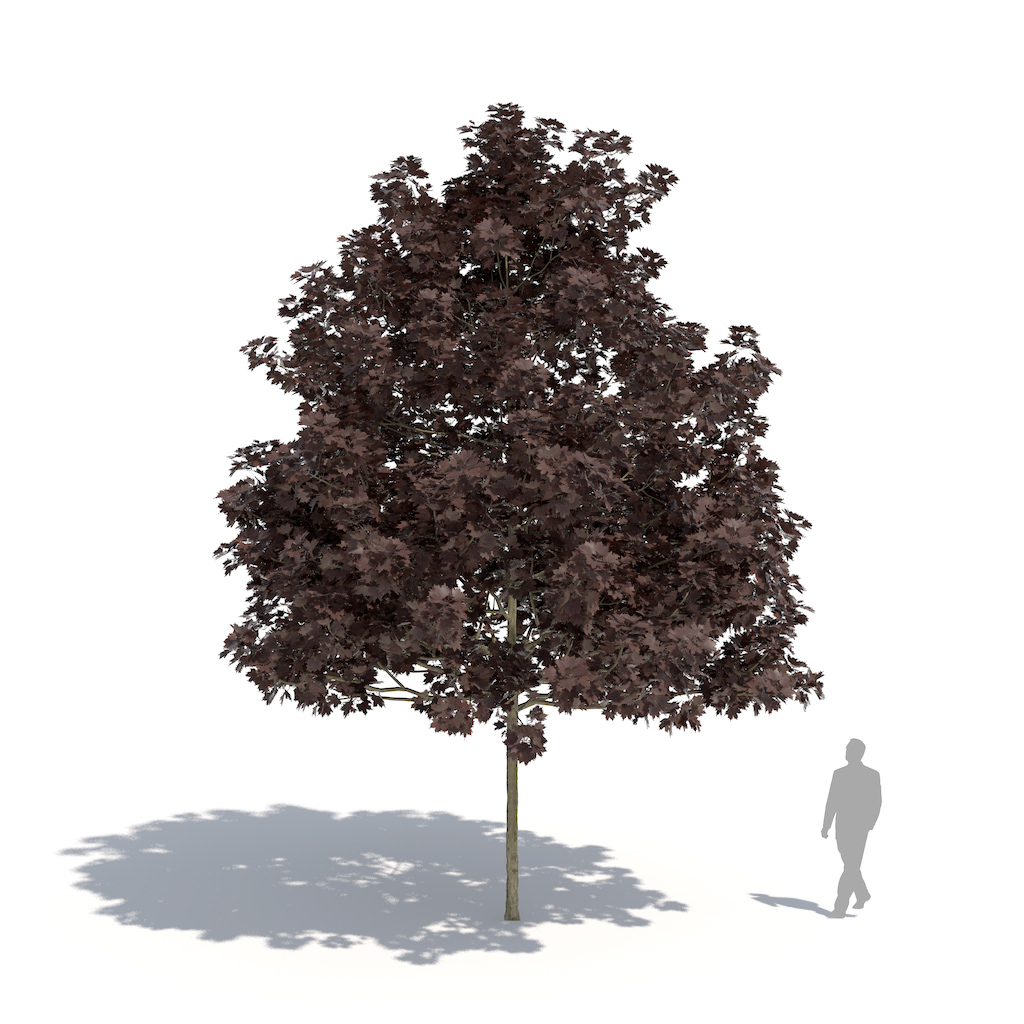 Faassen’s Black Norway Maple
Faassen’s Black Norway Maple
Acer platanoides ‘Faassen’s Black’
Medium-sized deciduous tree with a wide, dense, irregular conical crown. Clear stem, with dark-grey bark and light-brown branches. The unfurling leaf is light red. Leaves turn deep reddish-brown in summer, then dark red in autumn. Greenish-yellow flowers appear just before the leaf unfurls, making the tree a beautiful herald of spring. The unfolding red leaf contrasts boldly with the yellow flowers.
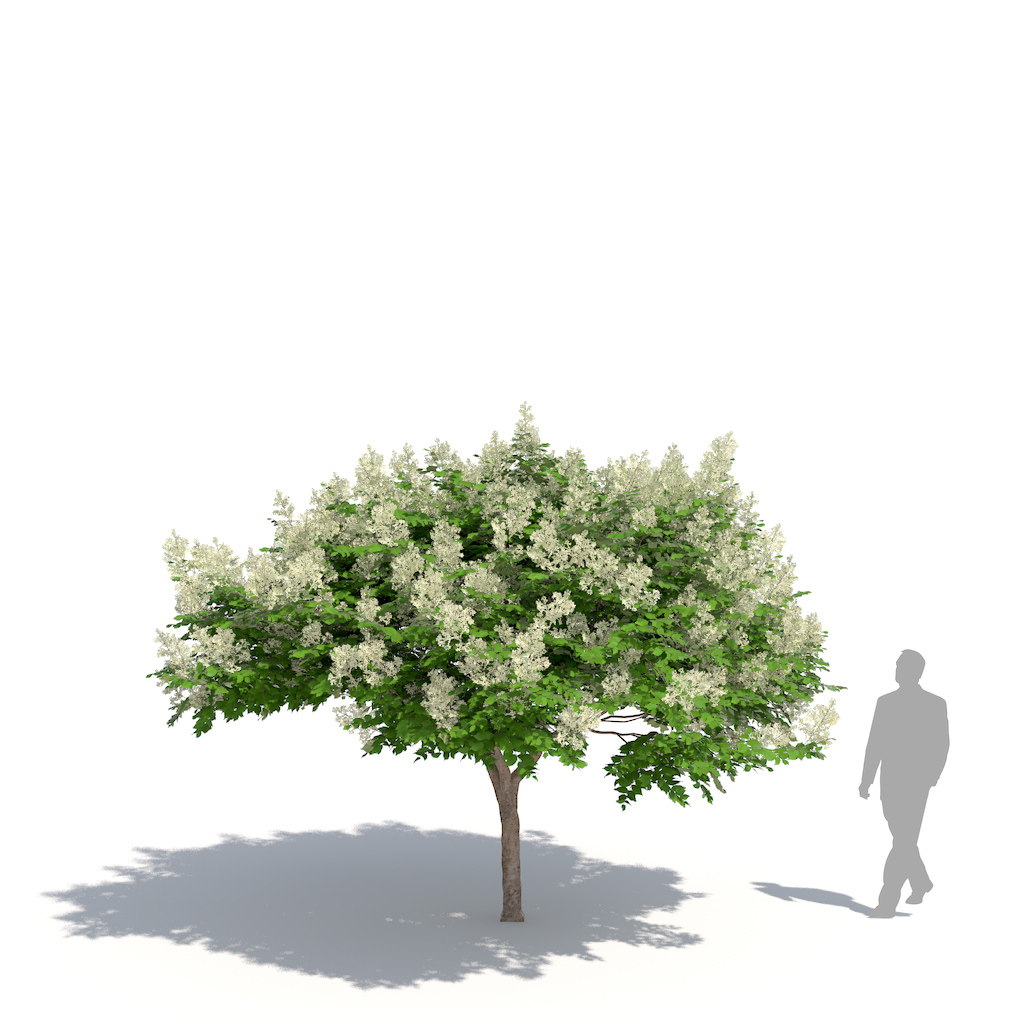 Japanese Angelica Tree
Japanese Angelica Tree
Aralia elata
Large deciduous shrub or small tree with a light, open, vase-shaped crown. Pithy, usually unbranched stems, with grey bark. Huge, showy, bipinnate, medium- to dark-green leaves at the tips of the stems. Leaves turn pale yellow to reddish-purple in autumn. Tiny, cream-colored flowers in large billowy panicles appear in late summer. Flowers are quite showy, and very attractive to bees. Clusters of fleshy, spherical, black drupes, which ripen from late summer into autumn.
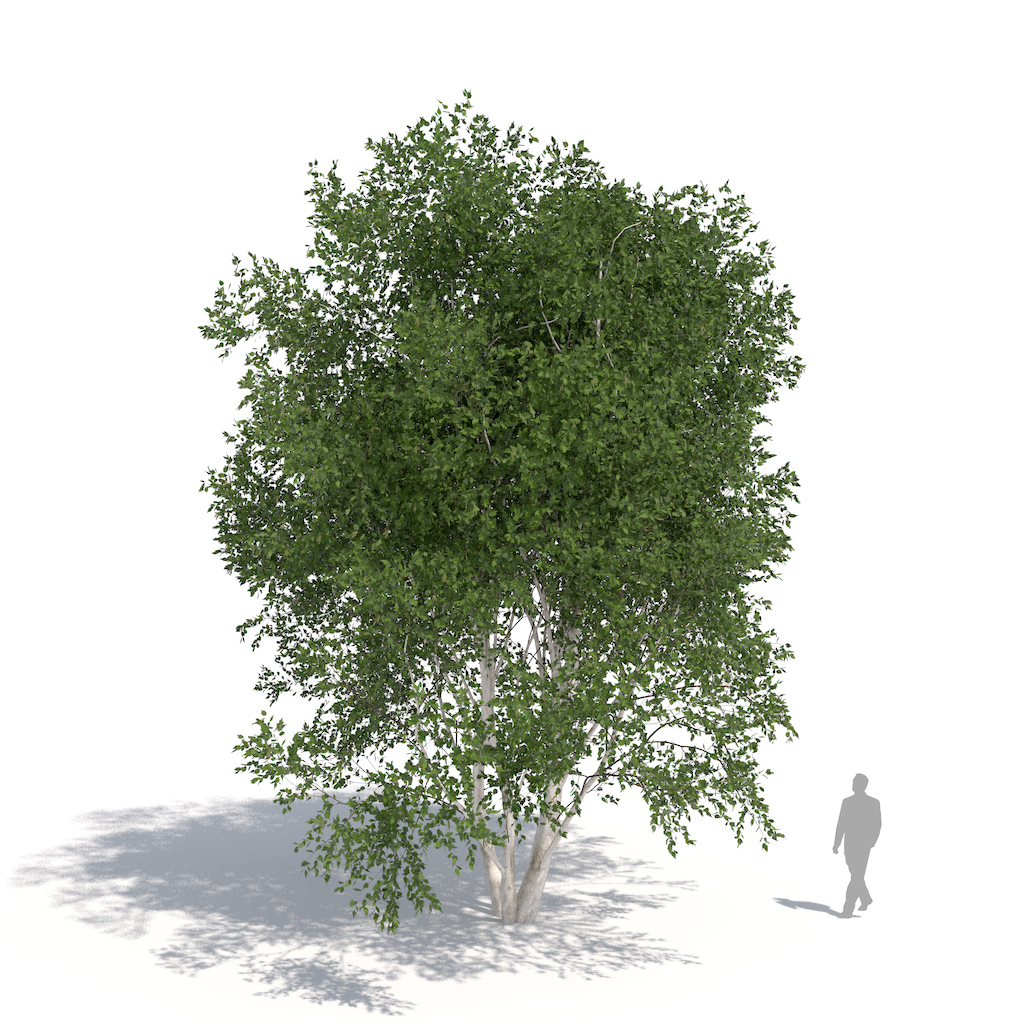 Paper Birch
Paper Birch
Betula papyrifera
Medium-sized deciduous tree with a loose crown and slightly pendent branches. Single-trunk trees usually have a rounded oval crown, while multi-trunked trees have a more irregular crown. Showy, white bark that exfoliates in papery strips to reveal an orange-brown inner bark. Ovate, irregularly toothed, dull green leaves, turning yellow in autumn. Yellowish-brown male flowers in drooping catkins, and greenish female flowers in smaller, upright catkins, followed by drooping cone-like fruits. Frequently planted as an ornamental due to its graceful form and attractive bark.
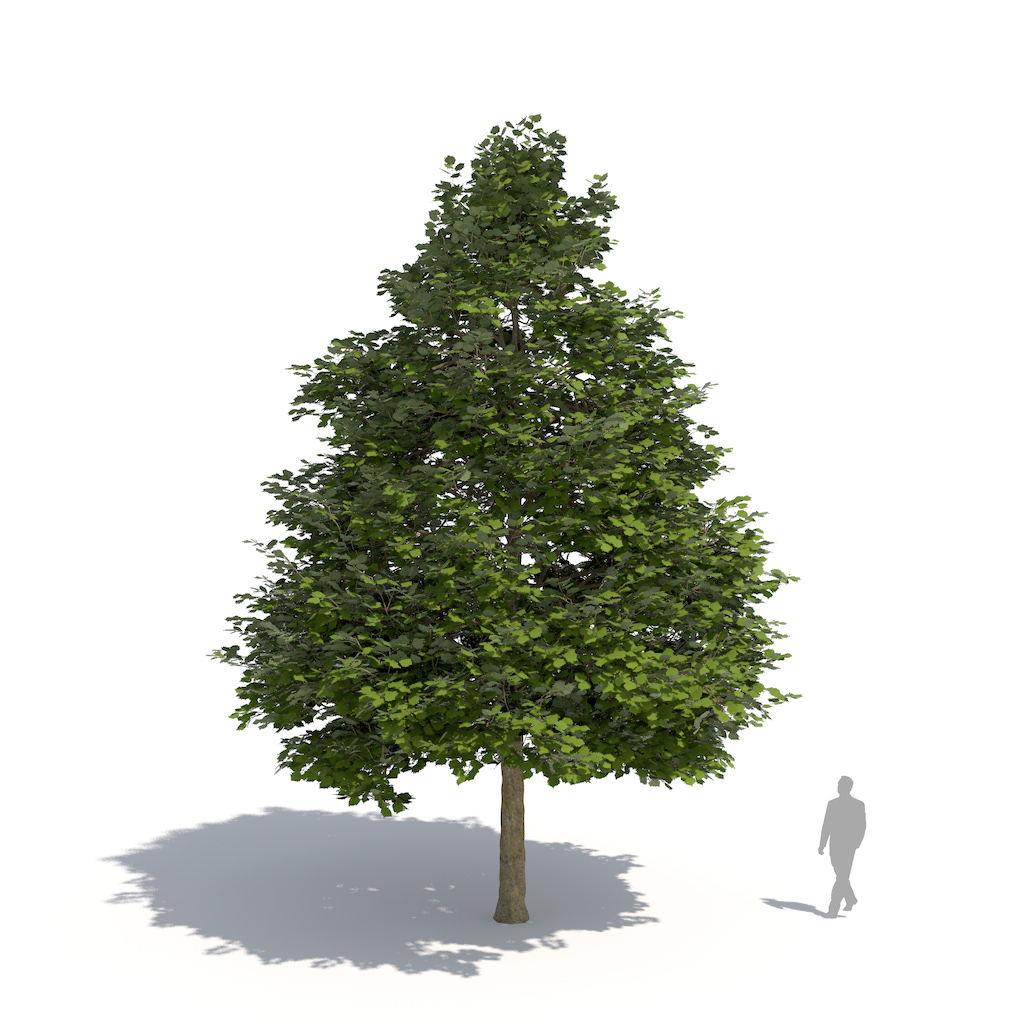 Turkish Hazel
Turkish Hazel
Corylus colurna
Medium-sized deciduous tree of symmetrical, conical habit. Straight, upright, gray trunk that gets a ridged, corky bark at an early stage, which flakes in small plates. Broadly-ovate, dark-green leaves, woolly haired, with double serrated margins. In autumn, leaves turn variable but usually unexceptional shades of yellow. Edible nuts appear in clusters of three to six with spiny, hairy involucre husks. Yellow male catkins hang down gracefully, with inconspicuous reddish female flowers appearing before the leaves.
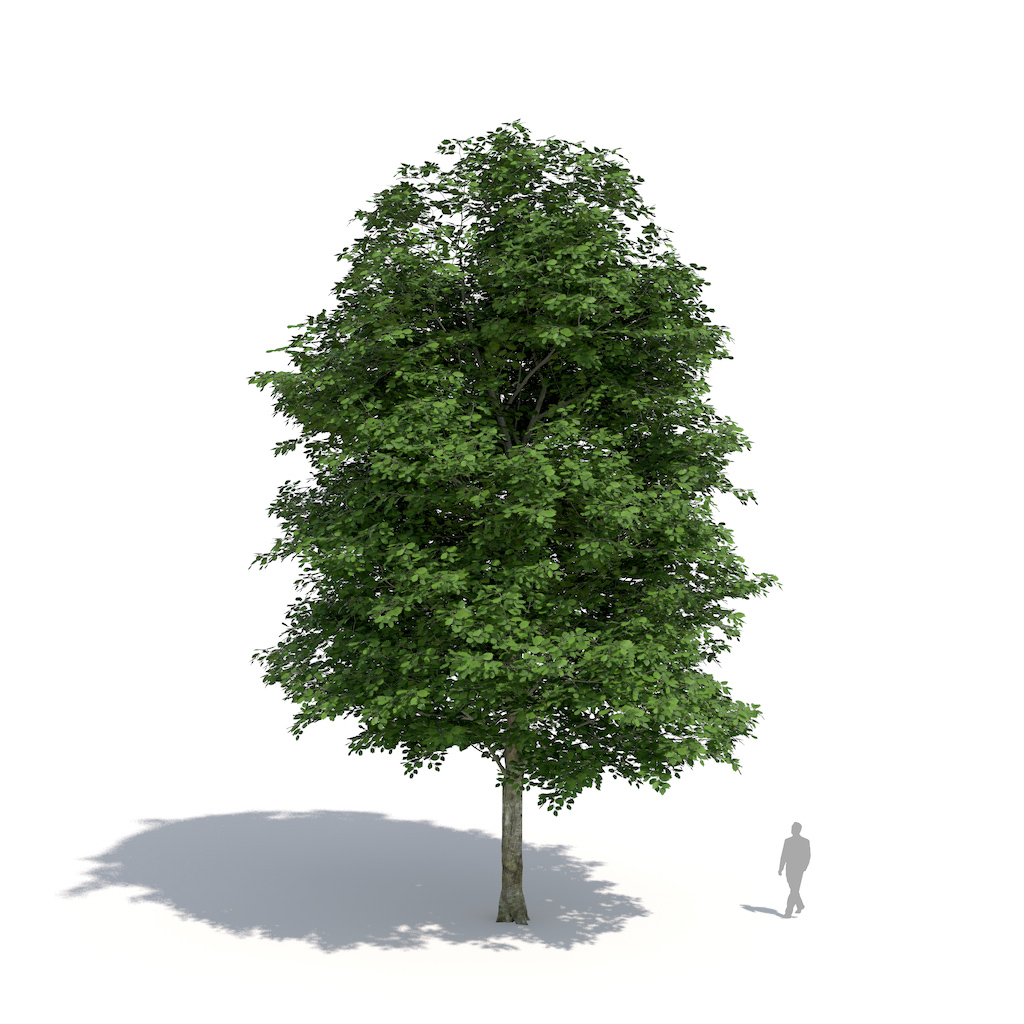 European Beech
European Beech
Fagus sylvatica
Large, vigorous deciduous tree with a dense, upright-oval to broad rounded-spreading crown. Distinctive bark is thin, smooth, and gray. Leaves broadly elliptic, yellow-green in spring, lustrous dark-green in summer, and rich golden-brown in autumn, often remaining on the tree until spring. Small, inconspicuous catkins. Edible beechnuts ripen in fall. Very popular ornamental tree in parks and large gardens, in temperate regions of the world.
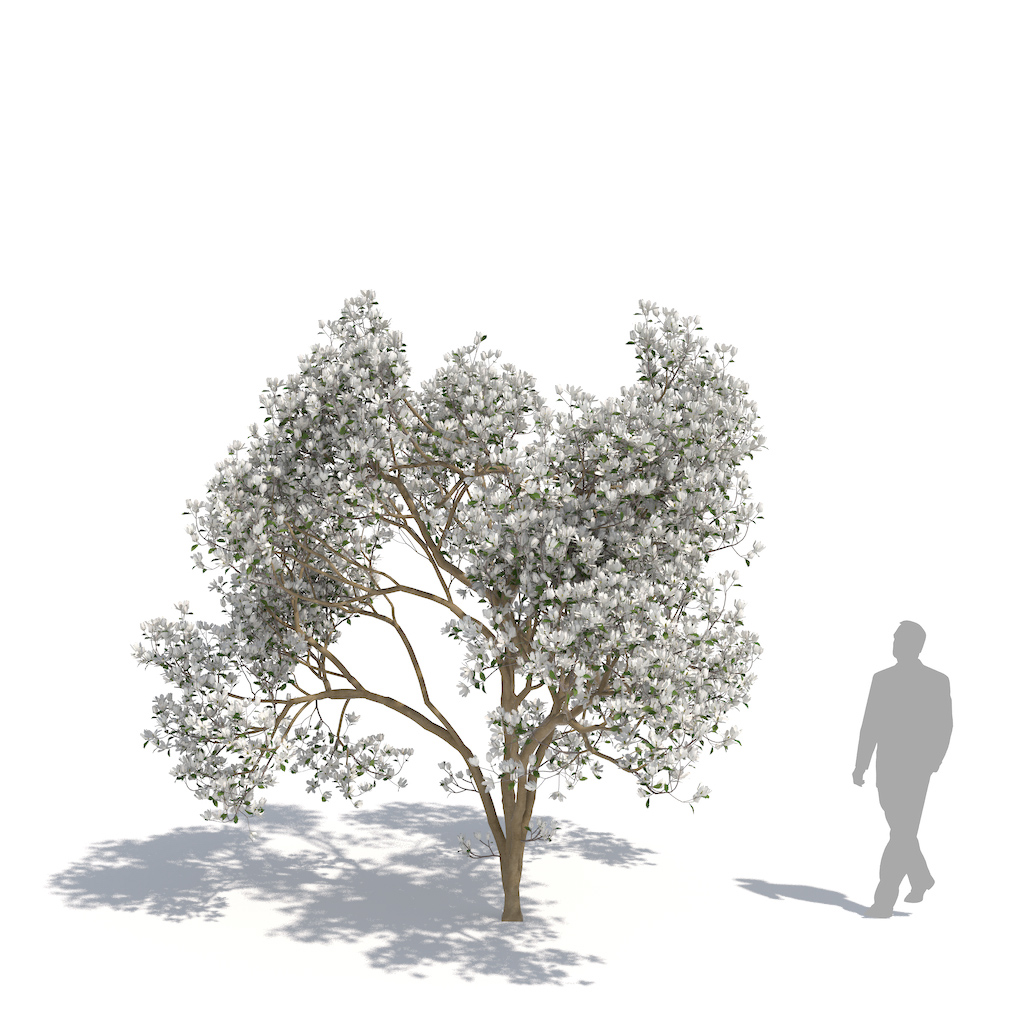 ‘Merrill’ Magnolia
‘Merrill’ Magnolia
Magnolia x loebneri ‘Merrill’
Shrub or small tree, often multi-stemmed, with an initially straight upright habit, then developing a vase-shaped, spreading, half-open crown. Smooth, greenish-gray bark. Narrow, obovate, medium-green leaves. Large, white, fragrant flowers, star-like, blushed with pink, with 10-15 petals, appear in early spring before the foliage. Cone-like fruits, ripening to red in late summer. Highly recommended cultivar with exceptionally abundant large flowers. An excellent specimen tree for the lawn or shrub border. It has gained the Royal Horticultural Society’s Award of Garden Merit.
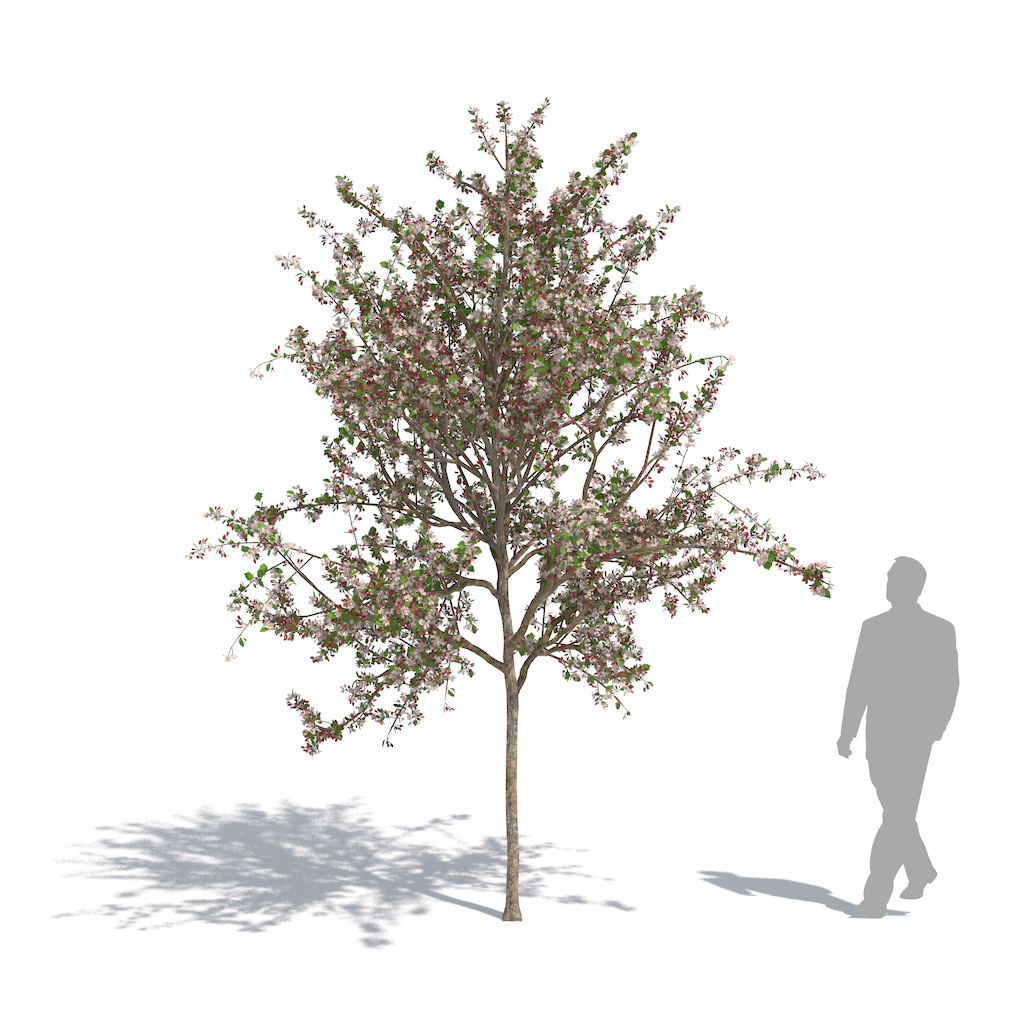 Showy Crab Apple
Showy Crab Apple
Malus floribunda
Small deciduous tree with a dense, round-to-umbel-shaped, half-open crown. Gray-brown trunk, with smooth bark peeling in thin plates from the mature trunk. Slender, ovate, serrate, dark-green leaves. Crimson buds open to profuse pale pink flowers, which mature to white. Profuse masses of small, yellowish fruits with a red blush, which are quite attractive to birds. Vigorous tree with one of the best mid-spring flowering displays of any of the crabapples. Used in large gardens, parks, and public gardens.
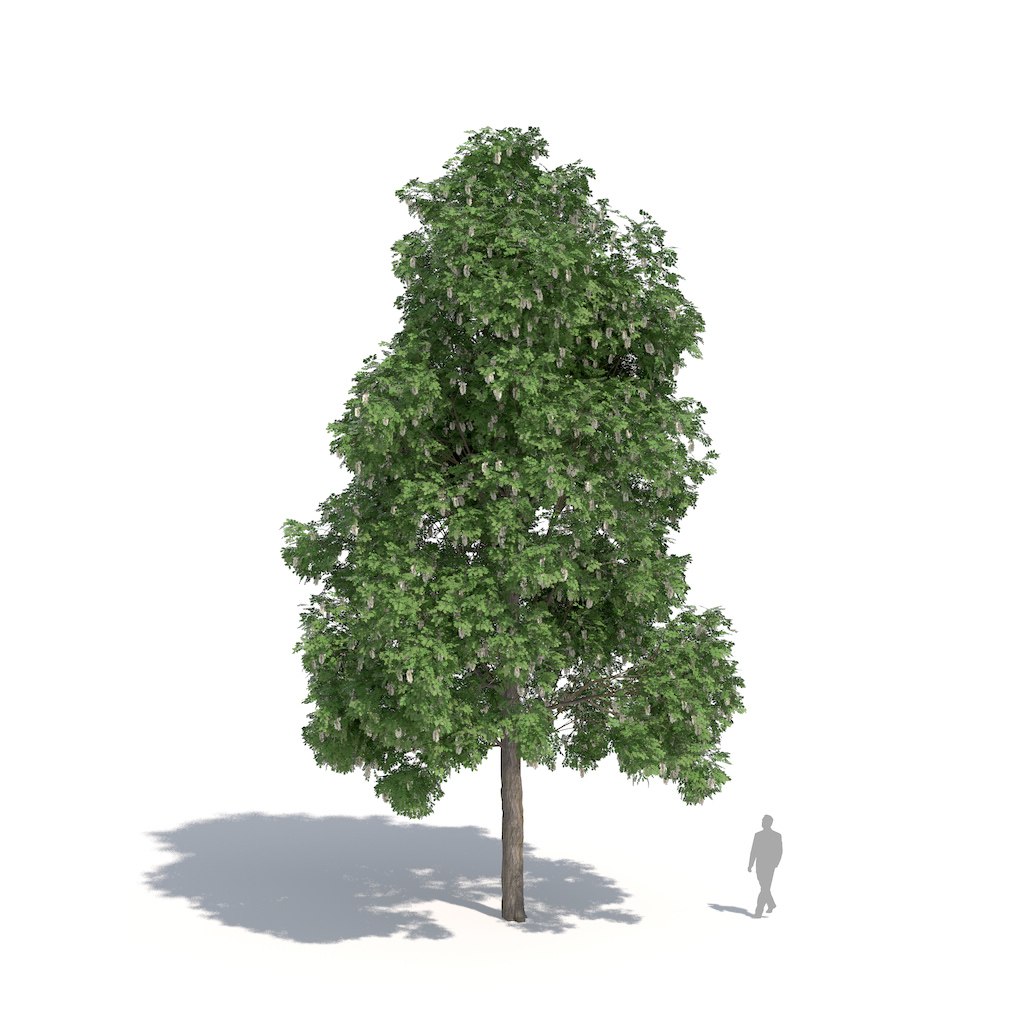 Black Locust
Black Locust
Robinia pseudoacacia
Medium-sized, fast-growing deciduous tree with an irregular, transparent, half-open, oval-to-rounded crown. Grayish, rough, deeply furrowed bark. Young twigs are olive-green to brown. Dark bluish-green leaves made of oval leaflets, turning yellow in autumn. Dense, drooping clusters of aromatic white flowers, borne in late spring and summer. Linear to oblong pods mature in autumn. The tree is a major honey plant in the Eastern US, and has also been planted in European countries. Often planted along streets and in parks.
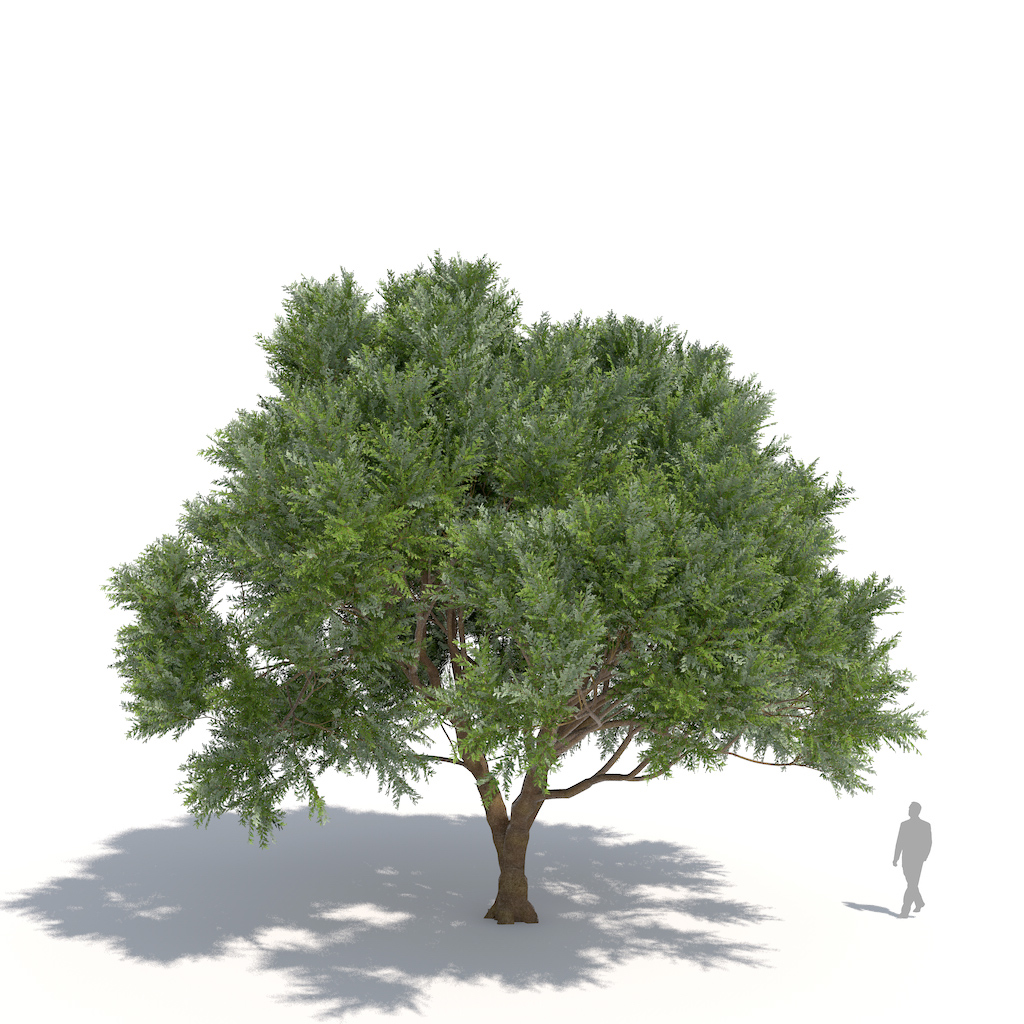 Salix Alba
Salix Alba
White Willow
Medium-sized, fast-growing deciduous tree with an irregular, half-open, oval-to-ovoid crown. Yellowish grey-brown bark, deeply fissured in older trees. Young twigs are yellowish-brown and very pliable. Long, narrow, pointed leaves, dull green above and blue-green underneath, with a silky texture that causes them to appear silvery-white at a distance. Fall color is usually a pale yellow, but sometimes appears as a more saturated yellow. Catkins appear with the leaves in spring.
System Requirements
Computer Hardware | A computer that is capable of running your version(s) of 3ds Max, Maya, Cinema 4D, SketchUp. |
|---|---|
Hard Disk Space | 10MB of hard disk space and additional space for the Laubwerk Plants models. |
Supported Hosts |
|
Installation Instructions | Our aim is to make the installation process as easy as possible for you. If you like to get more information, we have compiled these Laubwerk Plants Kits installation instructions, including advanced topics such as considerations when working in a network. |
Change Log
Update 1.0.49 (April 5, 2024)
Update 1.0.48 (December 22, 2023)
Update 1.0.47 (November 15, 2023)
Update 1.0.46 (July 17, 2023)
Update 1.0.45 (June 19, 2023)Maya
3ds Max
Cinema 4D
|
FAQs
Tutorials
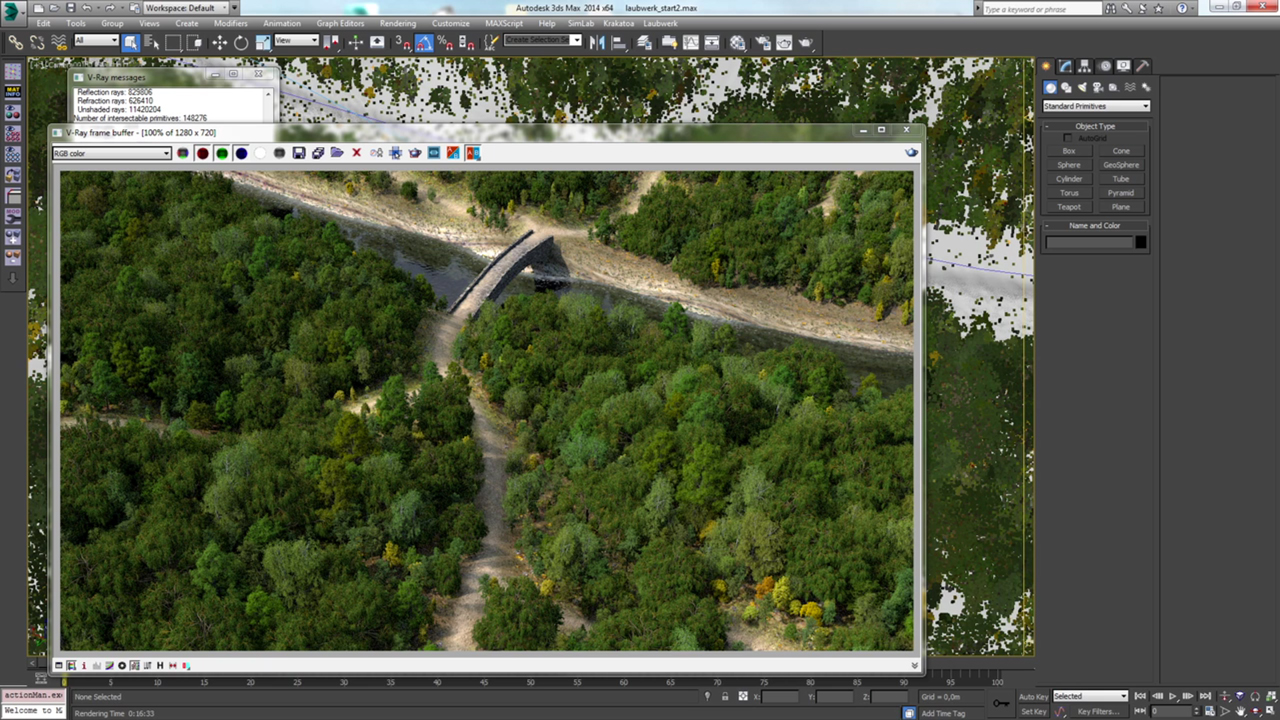
Laubwerk Plants integration with iToo Forest Pack
Learn how to use Forest Pack to instantly create stunning CG forest scenes using Laubwerk's line of beautiful, render-ready 3D tree species, inside Autodesk 3ds Max.
More...




